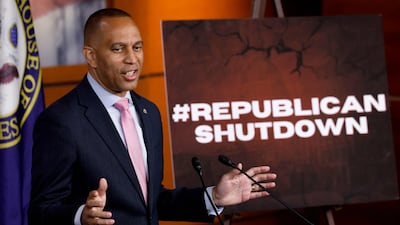The US federal government is once again on the brink of being shut down by political infighting in Congress. Republicans, who control the US House of Representatives, are struggling to agree a spending bill that must be passed before October 1 – weeks before the presidential election – to avoid many branches of government being closed down due to lack of funds.
The latest hurdle comes in large part from former president Donald Trump, who wants any new government funding agreement to be linked to a bill that would force people to show proof of citizenship when registering to vote.
The Democrats oppose such a measure and are also against Republican legislation on the grounds that its proposed cuts to disaster relief agencies, social security and veterans' health care are inspired by Project 2025, a right-wing template for how a future Trump administration might try to reshape the federal government.
“Once again, we find ourselves at another fork in the road,” the Democratic leader in the House of Representatives, Hakeem Jeffries, said on Thursday. “Extreme Maga [Make America Great Again] Republicans want to shut down the government because they are determined to jam Trump's Project 2025 down the throat of the American people.”
House Speaker Mike Johnson postponed a vote on Wednesday on a temporary spending bill, or continuing resolution, that would keep federal agencies and programmes funded for another six months.

On Thursday, Mr Jeffries urged moderate Republicans to help “avoid a Donald Trump-inspired extreme Maga Republican shutdown” by voting alongside Democrats. “We're willing to partner with you in a bipartisan path forward … This should not be that complicated, and we need to get this resolved within this calendar year,” he said.
More than a dozen Congressional Republicans are opposed to short-term funding, further complicating Mr Johnson's efforts to wrangle enough consensus to pass a spending measure. “We’re in the consensus-building business here in Congress … that's what you do,” Mr Johnson said on Wednesday. “We’re having thoughtful conversations, family conversations, within the Republican conference and I believe we’ll get there.”
In particular, Republican defence hawks and moderates have expressed opposition over a proposed block on increasing Pentagon spending for six months. Senator Mark Warner, a top Democrat in the upper legislative chamber, on Thursday said he was “sick of passing endless” temporary funding measures.
Speaker Johnson is also under pressure from Trump-aligned members of his Republican party to link the “Safeguard American Voter Eligibility Act” to the spending bill vote. The legislation would require new voters to submit “documentary proof of United States citizenship,” such as a passport or a birth certificate, in order to register to vote.
Mr Trump, the Republican presidential candidate, demanded on Tuesday that Congress “SHOULD, IN NO WAY, SHAPE, OR FORM, GO FORWARD” with a government funding measure without including the SAVE Act's provisions.
According to the Bipartisan Policy Centre, “illegal registration and voting attempts by noncitizens are routinely investigated and prosecuted by the appropriate state authorities, and there is no evidence that attempts at voting by noncitizens have been significant enough to impact any election’s outcome”.
This is the latest in a series of funding crises as the divided government inches closer to the expiration of a short-term funding measure. The federal government has shut down 21 times over the last five decades.
The most recent shutdown was also the longest. From December 2018 to January 2019, Mr Trump forced a government shutdown to receive funding for the US-Mexico border wall. It ended after 35 days without any funding for the wall.


